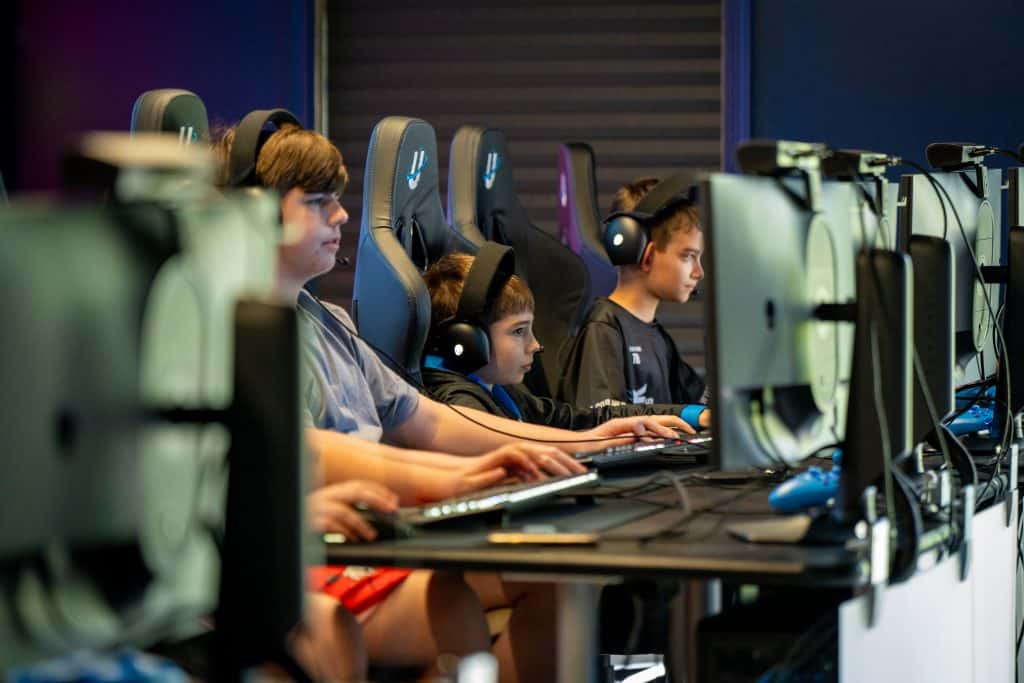How Working at Uplink Created a Shift in My Thinking About Gaming
Kelly Earnshaw
My earliest memory of playing a video game will certainly give away my age.
I am the youngest of 5 children. I idolized my older siblings. Not just my older, cooler sisters but my brothers as well. There was nothing better than sitting on the floor of my brothers’ faux wood paneled room and playing Space Invaders on our Atari until I could no longer stand the pain from the blister that developed between my thumb and index finger from the rubber covered joystick. I could have done without the poster of 80’s hair band RATT following me with their heavily made-up eyes watching my every move, but nothing could keep me from that magical time when I was allowed in their space to play that Atari.
That Atari was the only gaming system I had access to until I became a parent. Don’t get me wrong. I played a lot of Paperboy with my best friend across the street, but I did not have a gaming system in my own home until I invested in consoles for my children. These consoles came with strict rules: No games that involved shooting, foul language, or, what I considered, harmful messaging. Limited playtime and only after all the essential tasks were done, i.e., chores and homework. I was convinced too much time spent on video games was going to impact their mental and emotional health in profoundly negative ways.
Where did my negative perception of video games come from? How had I developed the mindset that nothing good comes from playing video games?
I cannot be certain, but I would guess that culture, media, and countless biased studies helped shape me into a mom who saw video games as a waste of time and an occasional “babysitter.” I was determined to not allow my kids to become “gamers.”
Fast forward to today. As I am writing this, I am surrounded by 40 gaming PC’s, neon lights and a 1,500 square foot tournament to host esports tournaments. What? I went from thinking video games were the downfall of our youth to being a huge advocate for kids being involved in esports.
So, what changed?
It is simple.
I watched, listened, and learned. I let go of what I thought I knew about gaming and leaned into the positive possibilities of video games and esports.
Here are the 5 things I leaned by working at Uplink:
Esports and video games teach teamwork and collaboration. As in traditional sports, no one person can carry a team. The same goes for video games. Competitive esports require players to engage in effective communication, play into each other’s strengths and weaknesses, and work together towards a common goal. Competitive esports teach kids how to lose gracefully and win while encouraging and praising their opponents.

Esports and video games enhance eye-hand coordination. As a 40-something who was accustomed to making Mario run in a straight line to gather coins and avoid turtle shells, with his only real skills being jumping and ducking, today’s video games make my head spin. The coordination needed between your eyes, brain, and hands is no joke. But today’s young gamers make it look so easy. It is fascinating to watch.
Esports and video games encourage self–control. I would venture a guess that at Uplink, we have some players who could single-handedly win a Rocket League game without the help of their teammates. But they are part of a team, and they know that their role is to help the whole team, to maintain their position on the field, to create success for all their teammates. This requires massive discipline and self-control, specifically for younger players. Continued practice in an esports team environment helps gamers see themselves as a piece of a larger, collaborative picture.
Esports and video games enhance relationships. It is time to squash the image of a teenage boy, sitting alone in his bedroom, yelling into a microphone in front of a PC. Wait, I just described my son. But truly, this is not how all gaming happens. Nothing is more gratifying than walking into Uplink and seeing kids at PC’s laughing, joking, moving, and engaging while gaming. Is there some yelling and excitement? Of course, there is but they are there, together, sharing space, in community.
Esports and video games create a sense of belonging for those kids who have struggled to find their place in the world. Nothing compares to a parent telling you that without Uplink esports, their child may have never found their place, a space where they felt safe and an environment where they truly experience belonging. Kids are unique, with unique needs and unique wants. Not every kid is destined to play football or field hockey. Not every kid wants to play a Division I sport in college. For those seeking a different type of team experience, surrounded by supportive peers, esports are the answer.
Still not convinced? I encourage you to experience an esports match in person. Take in the excitement of the players, the cheers from the friends, families and supporters and engage with the community that is an esports network of families. You may just see esports and video games through a whole new lens.

